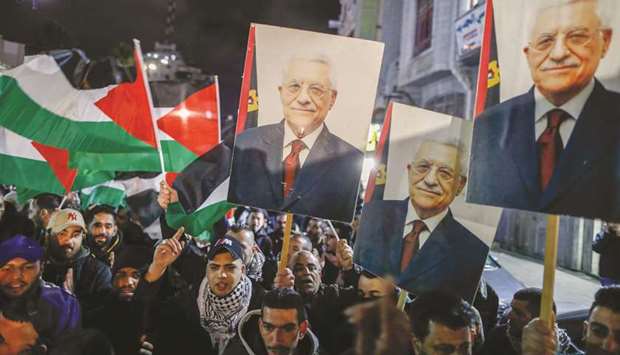President Donald Trump released his long delayed Israeli-Palestinian peace plan yesterday and promised “a new dawn” for the region, even though the Palestinians initially rejected the proposal as hopelessly biased.
Standing alongside Israeli Prime Minister Benjamin Netanyahu in the White House’s East Room, Trump said his plan could succeed where decades of failed previous US attempts to intervene failed.
“Together we can bring about a...new dawn in the Middle East,” Trump said to an enthusiastic audience that included throngs of Israeli and Jewish American guests.
Trump praised Israel for taking “a giant step toward peace” by accepting the plan, which lays out a vision for future Palestinian statehood if a series of strict conditions are met — including requiring the future state to be “demilitarised.”
The US president, who was followed at the podium by Netanyahu, painted a future where some $50bn in investments would eradicate the misery gripping Palestinians today, while allowing Israel never “to compromise its security.”
Criticising previous US diplomatic efforts as overly vague, Trump noted that his version was 80 pages long and contained a map depicting the proposed future neighbouring states.
However, the Palestinians angrily rejected the whole plan even before the White House rollout, saying it formalises the Israeli occupation of their territory.
Trump promised a “contiguous” future Palestinian state, addressing the current situation where Israel controls broad territory separating the two main population centres of the Gaza Strip and the West Bank. But the map showed the West Bank remaining riddled with Jewish settlements linked to Israel and only a road tunnel connecting the area with the seaside Gaza Strip.
The plan makes clear that the settlements, viewed by much of the international community as illegal occupation, would stay — and that Israel was free to annex them right away.
Israel would retain control over Jerusalem as its “undivided capital,” Trump said.
At the same time, the Palestinians would be allowed to declare a capital within occupied East Jerusalem, he said.
The Hamas movement, which runs the Gaza Strip, quickly rejected the proposals.
“We won’t accept any substitute for Jerusalem as the capital of the Palestinian state,” senior Hamas official Khalil al-Hayya said.
The announcement of the major diplomatic initiative came as both Trump and Netanyahu fight for their political futures.
Trump is in the midst of an impeachment battle over his alleged abuse of power and he faces a difficult reelection in November.
Pro-Israel evangelical Christians form a key part of his voter base and they have backed his frequent moves to bolster Israel’s position in the Middle East.
Netanyahu was formally indicted on three corruption charges yesterday after he abandoned an attempt to seek parliamentary immunity.
His right-wing Likud faces a neck-and-neck race with rival Benny Gantz’s centrist Blue and White party in a month’s time. But he is expected to benefit from the high-profile partnership with Trump.
Both men were interrupted by frequent applause and standing ovations during their speeches.
Netanyahu called the proposal “the deal of the century” and said to Trump “you have been the greatest friend that Israel has ever had in the White House.”
Trump said he had written yesterday to Abbas to enlist his support.
No Palestinian official attended the launch and their leaders had little say in the crafting of the plan.
“I explained to (Abbas) that the territory allocated for his new state will remain open and undeveloped for a period of four years,” Trump said.
“This could be the last opportunity they will ever have.”
“Palestinians are in poverty and violence, exploited by those seeking to use them as pawns to advance violence,” the president added.
“They deserve a far better life.”
In Gaza, thousands protested, burning pictures of Trump and the American flag.
There was also anger from Israeli hardliners.
Transport Minister Bezalel Smotrich, from the far-right Yemina union, said his party “won’t under any conditions agree to recognition, whether explicit or implicit, of a Palestinian state.”
The ambassadors from three Arab nations were at the White House, providing some evidence of Trump’s claim to have growing support around the region.
Russia, a growing force in Mideast politics, sounded sceptical, calling for Israelis and Palestinians to negotiate directly over a “mutually acceptable compromise.”
“We do not know if the American proposal is mutually acceptable or not,” Deputy Foreign Minister Mikhail Bogdanov told Russian news agencies.
Earlier, Foreign Minister Sergei Lavrov said initial indications reflected “an approach that is totally different from what has been recognised by the international community.”
Netanyahu’s office said he would travel to Moscow today to present the plan in person to President Vladimir Putin.
Trump said earlier that his plan was getting widespread support from “many” Arab nations and claimed that even Palestinians would come around.
“It’s very good for them, in fact it’s overly good for them,” Trump told reporters on Monday. “We think we will have ultimately the support of the Palestinians.”

Palestinian protesters wave the national flag and a portrait of president Mahmoud Abbas during a demonstration in the West Bank city of Ramallah yesterday, against US President Donald Trump’s peace plan proposal.
